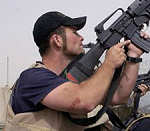 An article in Defense Industry Daily today highlighted a previous report by a watchdog group on Triple Canopy’s activities in Iraq. Triple Canopy is one of the major private military contractors in Iraq and has taken over many of the security contracts once held there by Blackwater (now Xe). One of the issues highlighted was the purchase by Triple Canopy and other private military contractors of arms from black market dealers in Iraq, which has led to more than a little tsk-tsking from some fronts.
An article in Defense Industry Daily today highlighted a previous report by a watchdog group on Triple Canopy’s activities in Iraq. Triple Canopy is one of the major private military contractors in Iraq and has taken over many of the security contracts once held there by Blackwater (now Xe). One of the issues highlighted was the purchase by Triple Canopy and other private military contractors of arms from black market dealers in Iraq, which has led to more than a little tsk-tsking from some fronts.
But as both articles point out, there’s a relatively simple explanation for what military contractors were buying AK-47s on the streets of Baghdad:
The U.S. awarded Triple Canopy a contract to protect more than a dozen sites across Iraq. At the time, the company had only a handful of employees. More serious, it didn’t have licenses to import the hundreds of weapons needed to guard sites across Iraq.
The company immediately applied for licenses after winning the contract, according to documents provided by Triple Canopy. Yet the government took months to approve the deal, not authorizing the company to collect the weapons until June 2004. In essence, the U.S. had awarded the company a lucrative contract, but then provided it little ability to arm for the job.
To get the firepower it needed in the meantime, the company turned to the unregulated and unlicensed Iraqi market, purchasing AK-47s and other weapons from local dealers, according to company officials and court records.
There was, however, another obstacle thrown in the way of export licenses for arms need by privately-contracted security forces in Iraq that wasn’t mentioned by the articles. This obstacle was thrown by Congress in the Iraq and Afghanistan Supplemental Appropriations Act of 2004. Section 2205 of that Act required that any shipment of small arms, even a shipment of one rifle, to U.S. private contractors in Iraq be notified by DDTC to Congress with all the delays that this would entail. And if Congress was in recess, add even more time, since notifications to the House can only be made when it’s in session. What did Congress expect American contractors on the streets of Baghdad in 2004 to defend themselves with while waiting? Spitballs?
Another unintended consequence of the delays imposed by Congress and the State Department on allowing exports of small arms to private contractors in Iraq can be seen in an anecdote that was related to me at the time. An employee of a security company needed to visit his company’s operations in Iraq on an expedited basis. On arrival in Iraq, he naturally acquired a weapon in country. (You would have too at the time.) So far, so good. But when he left Iraq, what to do with the weapon? Since it hadn’t been lawfully exported from the United States he would need an ATF permit, which he didn’t have and had no way to get, to bring it back into the United States. Â So, he left the weapon in his hotel room — as a tip of sorts, I suppose, for the housekeeping staff.
 Permalink
Permalink
Copyright © 2009 Clif Burns. All Rights Reserved.
(No republication, syndication or use permitted without my consent.)

 Posted by
Posted by  Category:
Category: 

